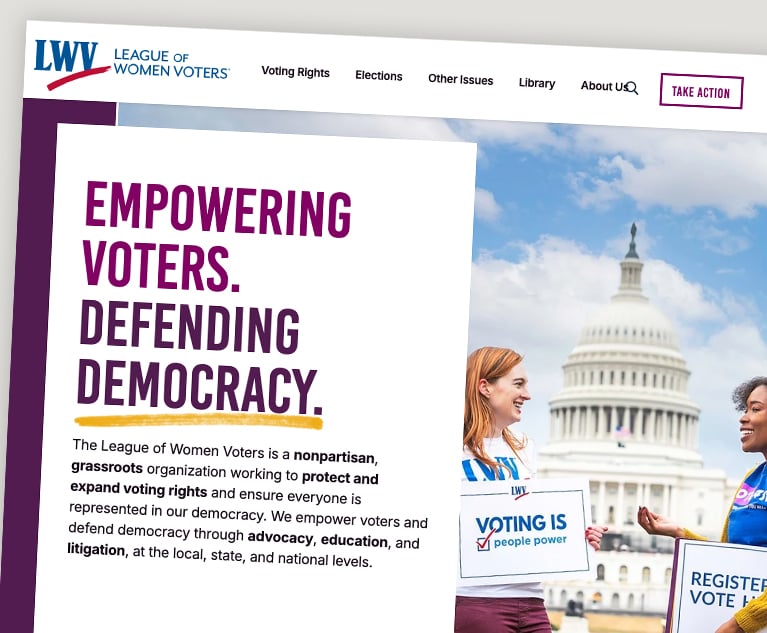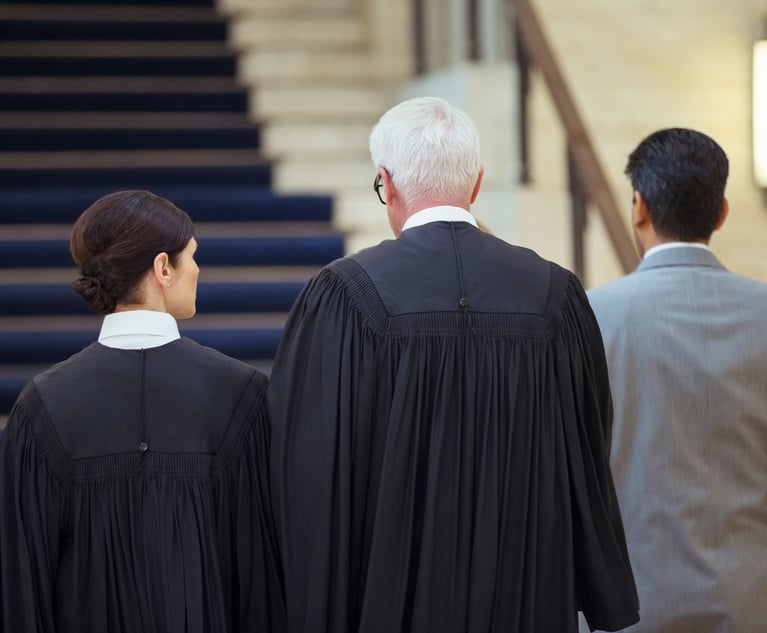Judicial Ethics Opinion 21-40
Subject to generally applicable limitations on campaign speech and conduct, a judicial candidate may permit their campaign committee to establish a Twitter account for campaign purposes and use it to "follow" the judge's election opponent and/or other candidates on Twitter during the window period.
July 22, 2021 at 04:55 AM
5 minute read
The Advisory Committee on Judicial Ethics responds to written inquiries from New York state's approximately 3,600 judges and justices, as well as hundreds of judicial hearing officers, support magistrates, court attorney-referees, and judicial candidates (both judges and non-judges seeking election to judicial office). The committee interprets the Rules Governing Judicial Conduct (22 NYCRR Part 100) and, to the extent applicable, the Code of Judicial Conduct. The committee consists of 27 current and retired judges, and is co-chaired by the Honorable Margaret Walsh, a justice of the supreme court, and the Honorable Lillian Wan, a court of claims judge and acting supreme court justice.
Digest: Subject to generally applicable limitations on campaign speech and conduct, a judicial candidate may permit their campaign committee to establish a Twitter account for campaign purposes and use it to "follow" the judge's election opponent and/or other candidates on Twitter during the window period.
Rules: 22 NYCRR 100.0(A); 100.0(Q); 100.5(A)(1); 100.5(A)(1)(c)-(f); 100.5(A)(2); 100.5(A)(2)(ii)-(iv); 100.5(A)(4)(a)-(c); 100.5(A)(4)(d)(i)-(ii); Opinions 19-37; 18-69; 15-121.
Opinion: A candidate for elective judicial office would like their campaign committee to use Twitter [1] during the window period to keep potential voters and community leaders informed about events and to direct them to the campaign website. The candidate asks if their committee may use the campaign Twitter account to follow other judicial and non-judicial candidates, including both their own slate and their election opponent. The candidate states that following such candidates on Twitter would be for the "express purpose of keeping up with news and events regarding all the candidates."
A judicial candidate, i.e. a judge or non-judge who is seeking public election to judicial office, may personally participate in their own campaign for judicial office during the designated "window period," subject to certain limitations (see 22 NYCRR 100.0[A]; 100.0[Q]; 100.5[A][1][c]; 100.5[A][2]). For example, the campaign must be conducted in a manner consistent with the impartiality, integrity and independence of the judiciary (see 22 NYCRR 100.5[A][4][a]), and the candidate may not, directly or indirectly, publicly endorse or publicly oppose (other than by running against) another candidate for public office (see 22 NYCRR 100.5[A][1][e]; see also generally 22 NYCRR 100.5[A][1][c]-[d], [f]). Among other restrictions, a judicial candidate may not make pledges or promises of conduct in office at odds with impartial performance of judicial duties (see 22 NYCRR 100.5[A][4][d][i]) nor make improper promises about controversies, cases, or issues likely to come before the court (see 22 NYCRR 100.5[A][4][d][ii]). Subject to these and other limits, however, a judicial candidate may appear in media advertisements and may be listed on election materials along with the names of other judicial and non-judicial candidates as part of a single "slate" of candidates (see 22 NYCRR 100.5[A][2][ii]-[iv]).
While we have previously addressed use of certain internet-based resources in judicial campaigns (see e.g. Opinions 19-37 [Eventbrite]; 18-69 [GoFundMe]; 15-121 [Facebook]), we have not previously addressed the propriety of using Twitter. However, we have said a judicial candidate may permit their campaign committee to establish and maintain a social media account for the campaign on Facebook during the window period (see Opinion 15-121). That campaign account may then add the campaign committees of other candidates on their slate as Facebook "friends" and/or click "like" on their campaign committees' Facebook pages, subject to generally applicable campaign ethics limitations (see id.). For example, the candidate must instruct their campaign committee to refrain from any comments that would create an appearance that the candidate directly or indirectly publicly endorses other candidates, including by commenting on their qualifications (see id.).
Here, too, we believe the judicial candidate may instruct their campaign committee to establish a Twitter account for campaign purposes and "follow" other candidates on the same slate, including those seeking non-judicial office (see Opinion 15-121). Moreover, as "following" other users on Twitter is a way to see their tweets and other social media activity more regularly and thus keep up with news and events during the applicable window period, we see no impropriety in using a campaign Twitter account to follow the accounts of an election opponent and/or other candidates who are not part of the candidate's slate.
As the candidate may not "directly or indirectly" engage in prohibited activity (see 22 NYCRR 100.5[A][1]; accord 22 NYCRR 100.5[A][4][b]-[c]), the candidate should instruct their campaign committee to adhere to all applicable limitations on campaign speech and conduct. This of course includes not only the prohibition on direct and indirect endorsements of other candidates already mentioned (see 22 NYCRR 100.5[A][1][e]; Opinion 15-121), but also the prohibition on making any pledges or promises of conduct in office at odds with impartial performance of judicial duties or making improper promises about controversies, cases, or issues likely to come before the court (see 22 NYCRR 100.5[A][4][d][i]-[ii]).
[1] Twitter is a social networking service which allows users to post relatively short messages (usually up to 280 characters of plain text), which may also include audio, video, images, and/or links to other pages. Like other social networks, Twitter facilitates user-generated content and interactions. For example, Twitter users may like, respond to, or re-post others' tweets or "follow" other users to see their posts more regularly.
This content has been archived. It is available through our partners, LexisNexis® and Bloomberg Law.
To view this content, please continue to their sites.
Not a Lexis Subscriber?
Subscribe Now
Not a Bloomberg Law Subscriber?
Subscribe Now
NOT FOR REPRINT
© 2024 ALM Global, LLC, All Rights Reserved. Request academic re-use from www.copyright.com. All other uses, submit a request to [email protected]. For more information visit Asset & Logo Licensing.
You Might Like
View AllTrending Stories
- 1Decision of the Day: Administrative Court Finds Prevailing Wage Law Applies to Workers Who Cleaned NYC Subways During Pandemic
- 2Trailblazing Broward Judge Retires; Legacy Includes Bush v. Gore
- 3Federal Judge Named in Lawsuit Over Underage Drinking Party at His California Home
- 4'Almost an Arms Race': California Law Firms Scooped Up Lateral Talent by the Handful in 2024
- 5Pittsburgh Judge Rules Loan Company's Online Arbitration Agreement Unenforceable
Who Got The Work
Michael G. Bongiorno, Andrew Scott Dulberg and Elizabeth E. Driscoll from Wilmer Cutler Pickering Hale and Dorr have stepped in to represent Symbotic Inc., an A.I.-enabled technology platform that focuses on increasing supply chain efficiency, and other defendants in a pending shareholder derivative lawsuit. The case, filed Oct. 2 in Massachusetts District Court by the Brown Law Firm on behalf of Stephen Austen, accuses certain officers and directors of misleading investors in regard to Symbotic's potential for margin growth by failing to disclose that the company was not equipped to timely deploy its systems or manage expenses through project delays. The case, assigned to U.S. District Judge Nathaniel M. Gorton, is 1:24-cv-12522, Austen v. Cohen et al.
Who Got The Work
Edmund Polubinski and Marie Killmond of Davis Polk & Wardwell have entered appearances for data platform software development company MongoDB and other defendants in a pending shareholder derivative lawsuit. The action, filed Oct. 7 in New York Southern District Court by the Brown Law Firm, accuses the company's directors and/or officers of falsely expressing confidence in the company’s restructuring of its sales incentive plan and downplaying the severity of decreases in its upfront commitments. The case is 1:24-cv-07594, Roy v. Ittycheria et al.
Who Got The Work
Amy O. Bruchs and Kurt F. Ellison of Michael Best & Friedrich have entered appearances for Epic Systems Corp. in a pending employment discrimination lawsuit. The suit was filed Sept. 7 in Wisconsin Western District Court by Levine Eisberner LLC and Siri & Glimstad on behalf of a project manager who claims that he was wrongfully terminated after applying for a religious exemption to the defendant's COVID-19 vaccine mandate. The case, assigned to U.S. Magistrate Judge Anita Marie Boor, is 3:24-cv-00630, Secker, Nathan v. Epic Systems Corporation.
Who Got The Work
David X. Sullivan, Thomas J. Finn and Gregory A. Hall from McCarter & English have entered appearances for Sunrun Installation Services in a pending civil rights lawsuit. The complaint was filed Sept. 4 in Connecticut District Court by attorney Robert M. Berke on behalf of former employee George Edward Steins, who was arrested and charged with employing an unregistered home improvement salesperson. The complaint alleges that had Sunrun informed the Connecticut Department of Consumer Protection that the plaintiff's employment had ended in 2017 and that he no longer held Sunrun's home improvement contractor license, he would not have been hit with charges, which were dismissed in May 2024. The case, assigned to U.S. District Judge Jeffrey A. Meyer, is 3:24-cv-01423, Steins v. Sunrun, Inc. et al.
Who Got The Work
Greenberg Traurig shareholder Joshua L. Raskin has entered an appearance for boohoo.com UK Ltd. in a pending patent infringement lawsuit. The suit, filed Sept. 3 in Texas Eastern District Court by Rozier Hardt McDonough on behalf of Alto Dynamics, asserts five patents related to an online shopping platform. The case, assigned to U.S. District Judge Rodney Gilstrap, is 2:24-cv-00719, Alto Dynamics, LLC v. boohoo.com UK Limited.
Featured Firms
Law Offices of Gary Martin Hays & Associates, P.C.
(470) 294-1674
Law Offices of Mark E. Salomone
(857) 444-6468
Smith & Hassler
(713) 739-1250










